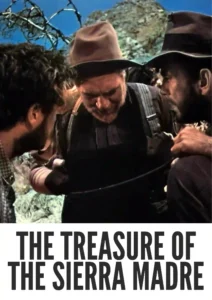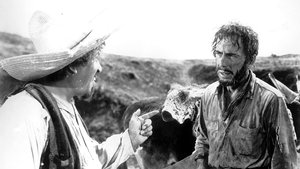Contact: info@alwanfilm.com
Video Sources 0 Views
- Watch trailer
- The Treasure of the Sierra Madre


Synopsis
Table of Contents
ToggleReview: The Treasure of the Sierra Madre 1948 Colorized – A Cinematic Masterpiece of Greed and Betrayal

Introduction
The Treasure of the Sierra Madre, released in 1948, is a timeless classic directed by John Huston, renowned for its exploration of greed, moral decay, and the human condition. With a stellar cast led by Humphrey Bogart, this film continues to captivate audiences with its gripping narrative, rich character development, and stunning cinematography. In this review, we delve into the enduring allure of The Treasure of the Sierra Madre and its profound impact on cinema.
Check The Full Colorized Movies List
Check Our Colorized Movies Trailer Channel
Understanding The Treasure of the Sierra Madre 1948 Colorized: Director, Cast, and Genre
Directed by John Huston, The Treasure of the Sierra Madre features a powerhouse cast including Humphrey Bogart, Walter Huston, and Tim Holt. The film transcends genre boundaries, blending elements of adventure, drama, and psychological thriller to create a riveting cinematic experience.
Exploring the World of The Treasure of the Sierra Madre 1948 Colorized: Plot and Characters
The Treasure of the Sierra Madre follows the perilous journey of three men – Fred C. Dobbs, Bob Curtin, and Howard – as they venture into the Mexican wilderness in search of gold. As their quest unfolds, they are consumed by greed and paranoia, leading to betrayal, violence, and ultimately, tragedy. The film explores themes of morality, human nature, and the corrupting influence of wealth.
The Art of Film Colorization
While The Treasure of the Sierra Madre was originally filmed in black and white, its early colorized version adds depth and richness to its breathtaking cinematography. The colorization process enhances the film’s visual splendor and captures the rugged beauty of the Mexican landscape with stunning clarity.
Early Colored Films: A Brief History
The history of early colored films is marked by innovation and experimentation as filmmakers sought to enhance the visual appeal of their movies. From hand-tinted frames to pioneering technicolor processes, the evolution of colorization techniques transformed the cinematic landscape, offering audiences a new way to experience the beauty and majesty of the silver screen.
The Treasure of the Sierra Madre (1948) and Its Early Colored Version
The decision to release The Treasure of the Sierra Madre in a colorized format was made with the intention of immersing audiences in the breathtaking beauty of its cinematography and enhancing the film’s visual impact. While some purists may prefer the original black and white version, the early colorized edition of The Treasure of the Sierra Madre adds a new layer of depth to its storytelling and captures the raw emotion of its characters with breathtaking clarity.
The Debate Over Film Colorization
The debate over film colorization continues to divide audiences and industry professionals alike. While some argue that colorization breathes new life into classic films and makes them more accessible to modern audiences, others maintain that it compromises the artistic integrity of the original work. As technology advances and filmmaking techniques evolve, the debate over colorization remains a topic of ongoing discussion within the film community.
Examining The Treasure of the Sierra Madre (1948) as an Early Colored Film
Viewing The Treasure of the Sierra Madre in its early colorized iteration offers audiences a fresh perspective on its breathtaking cinematography and rich storytelling. The colorization process enhances the film’s visual splendor and captures the rugged beauty of the Mexican wilderness with stunning clarity. As viewers are drawn into the gripping narrative and complex characters, they are treated to a visual feast that immerses them in the timeless allure of classic cinema.
Influence and Legacy: The Treasure of the Sierra Madre 1948 Colorized’s Impact on Cinema
The Treasure of the Sierra Madre is widely regarded as a cinematic masterpiece that continues to influence filmmakers and inspire new generations of cinephiles. Its exploration of themes such as greed, betrayal, and the human condition resonates with viewers of all ages, making it a timeless classic that remains relevant in today’s world.
Director’s Cinematic Legacy: Beyond The Treasure of the Sierra Madre 1948 Colorized
John Huston’s directorial legacy extends far beyond The Treasure of the Sierra Madre, encompassing a diverse body of work that includes acclaimed films such as The Maltese Falcon and The African Queen. As one of the most respected filmmakers of his generation, Huston was known for his ability to craft compelling narratives that explored the complexities of the human experience with depth and nuance. The Treasure of the Sierra Madre stands as a testament to his talent and creativity, solidifying his reputation as one of the great auteurs of classic Hollywood cinema.
Themes Explored in The Treasure of the Sierra Madre 1948 Colorized
At its core, The Treasure of the Sierra Madre explores themes of greed, betrayal, and the corrupting influence of wealth. Through its gripping narrative and rich character development, the film offers a nuanced portrayal of the human condition, challenging viewers to confront their own beliefs about morality and the pursuit of fortune.
Reception and Controversy Surrounding The Treasure of the Sierra Madre 1948 Colorized
Upon its release, The Treasure of the Sierra Madre received widespread critical acclaim for its breathtaking cinematography, rich storytelling, and powerhouse performances. While the decision to release the film in a colorized format sparked debate among purists, its enduring popularity has cemented its status as a timeless classic of the silver screen.
Where to Watch The Treasure of the Sierra Madre 1948 Colorized Online
For those eager to experience The Treasure of the Sierra Madre for themselves, the film is readily available on popular streaming platforms such as Amazon Prime Video, Google Play Movies, and iTunes. Whether viewed in its original black and white format or its early colorized iteration, The Treasure of the Sierra Madre offers a cinematic experience that is both captivating and visually stunning.
FAQs About The Treasure of the Sierra Madre 1948 Colorized
1. Is The Treasure of the Sierra Madre based on a true story?
No, The Treasure of the Sierra Madre is a fictional film that explores the themes of greed, betrayal, and the human condition through the eyes of its characters. While the film’s storyline may draw inspiration from real-life events, its plot and characters are works of fiction.
2. Who starred in The Treasure of the Sierra Madre?
The Treasure of the Sierra Madre stars Humphrey Bogart in the role of Fred C. Dobbs, a down-on-his-luck drifter who becomes consumed by greed on a quest for gold. He is supported by Walter Huston, who delivers a memorable performance as the grizzled prospector Howard, and Tim Holt as Bob Curtin, a fellow adventurer.
3. What is the central message of The Treasure of the Sierra Madre?
At its core, The Treasure of the Sierra Madre explores the corrupting influence of greed and the fragility of the human psyche. Through its gripping narrative and rich character development, the film offers a powerful commentary on the dangers of unchecked ambition and the pursuit of wealth at any cost.
4. Why was The Treasure of the Sierra Madre released in a colorized format?
The decision to release The Treasure of the Sierra Madre in a colorized format was made with the intention of enhancing the film’s visual appeal and immersing audiences in the breathtaking beauty of its cinematography. While some purists may prefer the original black and white version, the early colorized edition of The Treasure of the Sierra Madre adds a new layer of depth to its storytelling and captures the rugged beauty of the Mexican wilderness with stunning clarity.
5. What is the legacy of The Treasure of the Sierra Madre?
The Treasure of the Sierra Madre is widely regarded as a cinematic masterpiece that continues to influence filmmakers and inspire new generations of cinephiles. Its exploration of timeless themes and its breathtaking cinematography have left an indelible mark on cinema, solidifying its status as one of the greatest films ever made.
6. Are there any sequels or remakes of The Treasure of the Sierra Madre?
No, there have been no official sequels or remakes of The Treasure of the Sierra Madre. However, the film’s enduring popularity has inspired countless reinterpretations and homages in various media. Nonetheless, none have captured the raw emotion and timeless allure of the original 1948 classic.
7. Where can I watch The Treasure of the Sierra Madre online?
For those eager to experience The Treasure of the Sierra Madre for themselves, the film is readily available on popular streaming platforms such as Amazon Prime Video, Google Play Movies, and iTunes. Whether viewed in its original black and white format or its early colorized iteration, The Treasure of the Sierra Madre offers a cinematic experience that is both captivating and visually stunning.
Conclusion
In conclusion, The Treasure of the Sierra Madre (1948) stands as a cinematic masterpiece that continues to captivate audiences with its gripping narrative, rich character development, and breathtaking cinematography. Whether viewed in its original black and white format or its early colorized iteration, John Huston’s insightful direction and the powerhouse performances of the cast offer a cinematic experience that is both timeless and unforgettable.
As viewers are drawn into the perilous world of gold prospecting and moral decay, they are treated to a visceral journey that challenges their beliefs about greed, betrayal, and the human condition. The Treasure of the Sierra Madre remains a timeless classic that continues to enthrall and inspire audiences around the world.














